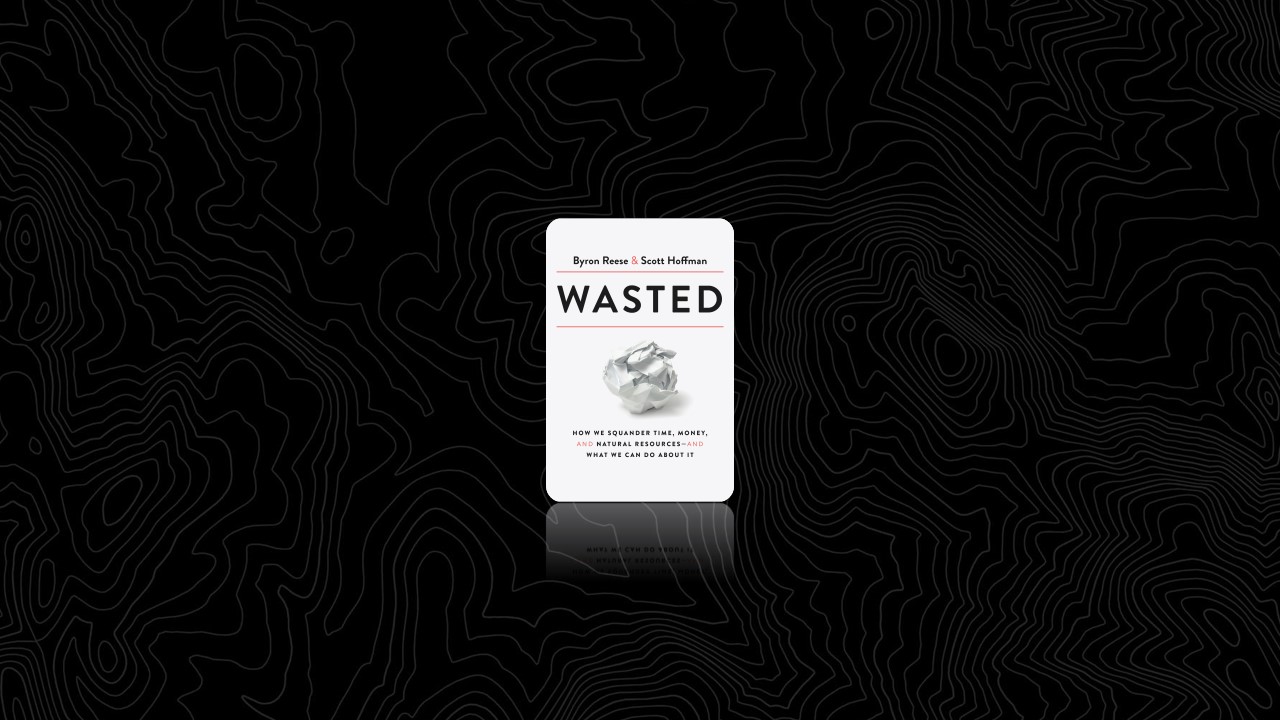Wasting Money
There are four ways money can truly be wasted. The first occurs when you don’t get the value you expect in a transaction, due to either fraud or misinformation—that is, when your expectation of the transaction is not met. Years ago, national ads appeared in magazines selling a solar-powered clothes dryer for $49.95. Recipients who purchased the dryer received…a length of clothesline. If you’ve ever ordered a hamburger at a fast-food place based on the photograph hanging above the menu and then been disappointed when your actual burger looks nothing like it, you know this feeling. And if there’s a way to train Sea Monkeys to do tricks, the authors haven’t figured it out. That money is wasted.
The second occurs when there’s a misunderstanding about the nature of a transaction you enter into. When some “fine print” provision of an agreement reduces the value you think you’re getting in a deal, it’s waste. In contract law there’s a notion called a meeting of minds. It states that you can’t have a binding contract when parties don’t have the same understanding of the nature of the agreement. If you didn’t understand that by buying a new car you were also agreeing to pay the dealership for undercoating, that $500 is wasted. If you didn’t realize that the only time you could use that timeshare property is when your kids are in school, well, it’s a waste.
The third situation occurs when you enter into an adverse transaction unwillingly. When some mysterious feature gets added to your cellphone plan that you didn’t even know was there, that’s wasted money.
Finally, money is wasted if you’re deemed mentally unable to enter into a transaction. This is more common than it sounds and is the reason that children often can’t sign contracts or engage in certain activities. If someone is drugged and gets an image of Betty White tattooed on their biceps in Acapulco, that’s wasted money.
What of slips on icy sidewalks and auto accidents? The money spent to fix problems caused by such events isn’t wasted, because we walk on icy sidewalks and drive knowing that these risks exist.
The upshot of it all is that when a mentally competent person who understands the nature of a transaction and possesses accurate information voluntarily undertakes that transaction, it’s hard to say that money was wasted.
Wasting Time
What are we doing when we aren’t sleeping or working? In the United States, the second-largest use of our time is actually…television. According to Nielsen, as recently as 2018 we spent four hours a day watching it. That’s broadcast television in real time, the same way the Pilgrims used to watch it. We’re not talking time-shifting DVR or YouTube, just plain TV. And given that nearly a quarter of that time is commercials, that’s an hour a day being told you have bad breath or are balding or that your car isn’t quite adequate. Multiply the numbers out over a lifetime, and you’re likely to spend well over two years of your life just watching commercials. That doesn’t count all the other ads you come across, all the radio and billboards and internet ads. Is that two years of life wasted time? Maybe not. If you value the shows you are watching, well, they have to be paid for, and that’s what you are doing by watching those ads.
TV isn’t even a majority of the media we consume. According to the same Nielsen study we spend eleven hours a day consuming media, which includes reading, listening, and watching. There’s overlap here with the work time we discussed earlier. You may be watching a video at work, which would result in the double counting.
Of those eleven hours, we spend three on our smartphones. This particular part is a new phenomenon, and it accounts for our rising consumption of media. Our behavior here has been heavily modified over the last decade. Now many of us can’t step into an elevator without whipping out a phone to check email. How else are we going to spend the eternity it takes to get to the seventh floor? But again, we can’t categorically count any of this as wasted time.
What about time spent in the car? On average, drivers in the United States spend about an hour a day and drive an average of 30 miles. Over the course of your life, the amount of time you will spend waiting for red lights to turn green is measured in months. Is all of that wasted time? Conceptually, yes. After all, you’d ideally want to be able to step into a Star Trek–like transporter and just appear where you want to go, right? But transporters don’t exist, and we are willing to spend the time to get wherever we are going. So we can’t practically regard this time spent as waste until there is a better alternative.
Then there’s…everything else. The average person spends an hour a day eating and another hour a day doing chores. Over a lifetime, each of those amounts to a couple of years of your life. Add in another year of your life sitting on the toilet.
If any of this makes you feel bad, consider that the animal kingdom is full of time-wasting slackers, too. By one estimate, in a given ant colony, 3 percent of the ants are workaholics and never stop, about a third seem to do absolutely no work at all, and the rest work some and slack some. These percentages may not be all that different from a human colony. Ants also have behaviors that sure look wasteful. They stack their dead in intricate ways, or bury them in specific spots, only to later rearrange them or dig them up and move them.
What about ways to prolong your life, to add additional time? One candidate could be to take up a physical activity like jogging. Some older research suggested that you could increase your life span by three years by regularly jogging. But if you do the math, you would be spending those three years, well, jogging. Is that worth it? You decide.
Newer research suggests you can get a much better return on your jogging misery. An hour of jogging a week, spread out over four days, works out to about six months of jogging over an adult life, and could add perhaps six years to your life span. Biking seems to yield a similar return. A high-stress life, on the other hand, takes away about that much time. Being happy is perhaps the best medicine of all.
But the easiest way to eliminate wasting time is through technology. We don’t walk up the hill to haul water from the well anymore; we turn on the tap. Imagine household chores before electricity: washing clothes before washing machines, heating a home with wood, et cetera. While labor-saving devices at work haven’t lessened the number of hours people on average put in at the office, time recouped with labor-saving devices at home has been pocketed, so to speak, and we now have it for leisure. That’s why we can consume media eleven hours a day.
Wasted Human Potential
Imagine a world where everyone had the opportunity to achieve their maximum potential. In the grand scheme of things, only a few elites have anything close to such power over their lives today. The exhortation that “you can do anything you set your mind to” is true only for a very few people. If you’re one of the fortunate few, you can choose an educational path that probably involves a university, then select a profession. If a job isn’t to your liking, you can get a different one—perhaps taking a lengthy period of time with no profession at all. If a dozen years into your career you decide you want to be a research scientist or a candlemaker, you can ditch the life you have and start afresh. Doing so may not be easy, it may involve debt or an investment of time, but it’s within your reach. You can speak your mind freely without fear of persecution, pursue things that interest you, and expend energy over causes that excite you.
Now imagine a world in which everyone had that kind of power over their own lives. Think of all the diseases we could cure if a hundred times as many people worked on each one. Imagine the art that would fill our lives and the great literature that would be produced. The gap between the world we have and this world we can imagine is the scale of the wasted human potential that occurs today. And that waste is so large it’s truly beyond our imagination.
The gap between what could be versus what is may sound quite disheartening, but there’s reason to have a great deal of hope. In virtually all places, by virtually every measure, things are getting better in terms of giving people more self-determination and agency over their own lives.
Every day there is more literacy, more self-government, more access to medical care, more individual liberty, more equality before the law, and rising standards of living everywhere you look. What originally took millennia to begin in the first place now can happen quickly. South Korea went from 22 percent literacy in 1945 to 88 percent in 1970 to 99 percent today. But as fast as these sources of waste are being eliminated, the process is still heartbreakingly slow, and puts the waste that occurs from ordering the wrong size sneakers from an online shop into dramatic relief. Next to the waste of lives, everything else pales.
Some Final Words on Waste
Is it possible to achieve a world without waste—one in which we exist at the ultimate pole of our continuum? After all, no amount of human effort can capture all of the energy of the sun. Nor can it abolish friction or bring back the dead. But the bits of the universe we do actually control can be put to constructive purpose, and to the extent we’re able to align our values with our actions, we can live in a world with less waste.
New technologies on the horizon can do even more to reduce waste. We will purify water more efficiently, generate clean energy more cheaply, and eliminate diseases more effectively. Every day scientists invent amazing new materials that promise to do miraculous things.
The good news is that many of these technologies disproportionately help those in the developing world. With better ways to grow food, provide clean water, and generate energy, the poorest billion or so people who have thus far seen little benefit from the technological marvels of the last couple of decades finally have a real reason to hope.
In the end, this is ultimately a book about hope. The world is full of waste, but there’s less than there was yesterday, and tomorrow there will be even less. Sure, there’s still too much, but we’ll get there. We may not get to a world without waste, but it looks certain that we’re going to get much closer.


